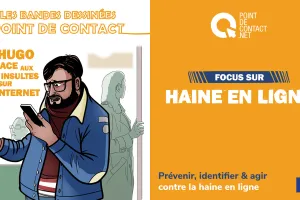The French hotline Point de Contact, part of the French Safer Internet Centre, makes available to the public the comic strip "Hugo faces insults on the internet" (in French: "Hugo face aux insultes sur internet").
This resource illustrates two situations that Hugo is exposed to: Vlad, Hugo’s friend, is gay and attended the Gay Pride parade. After the event, he posted a photo of himself on social media and received a wave of insulting and discriminatory comments related to his sexual orientation in response to his post. At the same time, Madame Salem received a national award. This led to a wave of online hate targeting her, based on her gender and origins.
The comic explains that these waves of online hate are becoming increasingly frequent and normalised. It also describes the different legal criteria that define such content as illegal (hate speech) and highlights the right response when exposed to this kind of content: reporting it so that it can be taken down.
This educational resource is intended for dissemination among young people, their families, professionals, and all members of the educational community. Raising awareness about cyberviolence is a crucial component in the fight against such harmful behaviour. Reporting these cyberviolences - whether as a victim or as a witness - is a fundamental civic duty to which everyone is called to contribute.
About this resource
The French hotline Point de Contact, part of the French Safer Internet Centre, makes available to the public the comic strip "Hugo faces insults on the internet" (in French: "Hugo face aux insultes sur internet").
This resource illustrates two situations that Hugo is exposed to: Vlad, Hugo’s friend, is gay and attended the Gay Pride parade. After the event, he posted a photo of himself on social media and received a wave of insulting and discriminatory comments related to his sexual orientation in response to his post. At the same time, Madame Salem received a national award. This led to a wave of online hate targeting her, based on her gender and origins.
The comic explains that these waves of online hate are becoming increasingly frequent and normalised. It also describes the different legal criteria that define such content as illegal (hate speech) and highlights the right response when exposed to this kind of content: reporting it so that it can be taken down.
This educational resource is intended for dissemination among young people, their families, professionals, and all members of the educational community. Raising awareness about cyberviolence is a crucial component in the fight against such harmful behaviour. Reporting these cyberviolences - whether as a victim or as a witness - is a fundamental civic duty to which everyone is called to contribute.
About this resource
- hate speech online hate cyberbullying
Related content
- < Previous resource
- Next resource >
- < Previous
- Next >







